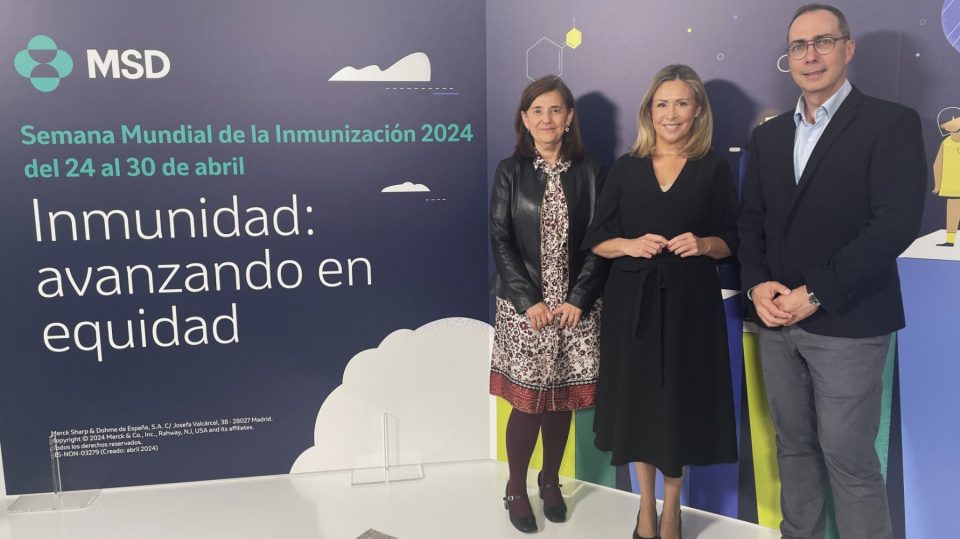“Spain is losing its sense of danger without vaccination”

Immunization campaign of the pharmaceutical company MSD
There are more than 40 vaccines available to prevent 27 preventable diseases.
Solutions must be sought to improve vaccination coverage worldwide and in all populations.

Immunization is the process by which a person becomes resistant to a disease, either through exposure to certain diseases or through the administration of a vaccine. They stimulate the body’s immune system to protect a person from infections and diseases. Immunization prevents illness, disability and death from preventable diseases. However, the beneficial effects of this reality are often ignored and illness comes unnecessarily.
For this reason, the biopharmaceutical company MSD launched a campaign on the occasion of World Immunization Week 2024 – with the support of WHO Immunity: Advancing Equity, supported by 50 social health organizations.
Immunization is a success story for global health and development, saving millions of lives every year. In fact, vaccines are essential for the prevention and control of many infectious diseases, thereby maintaining global health security.
Dr. Manuel Cotarelo, director of the medical department of vaccines and virology at MSD Spain, noted that at MSD “we are committed to fighting infectious diseases and its prevention at the global level to improve the lives of all people. With this initiative, we want to highlight the importance of immunization as a tool for equity and the need to work towards equal access, ensuring coverage without distinction of age, gender or affiliation. geographical position. Additionally, at MSD we recognize the connections that exist between people, animals and the environment. In this sense, it is important to approach immunization in a way that integrates human and animal health from a One health“
Equity in immunization
In recent years, Spain has made great strides in immunization, which is reflected in calendars vaccination of the population. High rates are necessary to prevent the spread of complications of infectious diseases and possible premature death of people. Recent developments include immunization against RSV in newborns and children <6 months of age, as well as vaccination against rotavirus, human papillomavirus (HPV) in adolescent males, influenza and meningitis in the pediatric population, and herpes zoster in people over 65 years of age. years, and, in addition, cohorts from 66 to 80 years of age can be gradually recruited, starting with the population that turns 80 years old.
However, the benefits immunization They are unevenly distributed: coverage varies greatly between and within countries. Some population groups have limited access to immunization services. But in other countries too, progress has stalled or even reversed, and there is a real risk that overconfidence will undermine the progress already achieved. Measles outbreaks and polio caused by vaccine-derived polioviruses are a reminder that strong immunization programs and effective disease surveillance are needed to maintain high levels of coverage and eliminate and eradicate diseases. “In particular, immunizing children helps prevent disease and promote health from childhood. Reducing inequality in immunization coverage should allow all age groups to have the same opportunity to lead a healthy lifestyle,” says the doctor. Jaime PerezPresident of the Spanish Association of Vaccinologists (AEV).
The expert notes that in the United Kingdom, recognizing the importance of equitable access to immunization, they have detailed some recommendations that could help achieve this goal, such as developing a national strategy to combat immunization inequalities and providing a model local action plan. allows you to use best practices; share new practice and evaluation results among stakeholders to develop the evidence base; develop locally relevant data and analytical resources to support needs assessments; monitor inequalities in coverage of key indicators and maintain national leadership and support to address inequalities. “And vaccines have an effective component reducing inequality caused by infectious diseases, is one of the public health interventions that can arguably make the most important contribution to equity. But for this, vaccines must reach the population fairly,” the expert notes.
Immunization problems
Although immunization coverage in Spain is good, rates among adults and at-risk groups could be improved. “With influenza, no age group reaches 80% coverage. The closest ones are over 75 years old, with a vaccination rate of 75.27%, followed by the age group 65-74 years with 61.57% of the population immunized. In pregnant women, this percentage drops to 50%,” explains Dr. Pilar Arrazola, head of preventive medicine at the 12 October Hospital (Madrid).
Likewise, good epidemiological and coverage data are important for making policy decisions to improve immunization coverage of the entire population. “In fact, when it comes to coverage and equity, one of the core principles of implementing the Immunization 2030 Agenda (AI2030) strategy is that it must be data-driven. Systems based on them for immunization “They should be expanded at the subnational level to map and monitor under-immunized and non-immunized (“zero dose”) populations and certain marginalized groups to ensure that all people are covered by the immunization program,” explains the expert.
“Solutions must be sought to improve vaccination coverage worldwide and in all populations. The value of immunization today is undeniable: vaccines prevent 3.5 to 5 million deaths worldwide each year. And, in addition, there are more than 40 vaccines against prevention of 27 preventable diseases. In this sense, the work being done by the scientific community is important as it continues to actively work to find solutions to other potentially serious diseases, such as HIV, infections caused by bacteria resistant to antibiotics or certain types of viruses. cancer,” concludes Karina Escobar, President of the Patient Organizations Platform (POP).